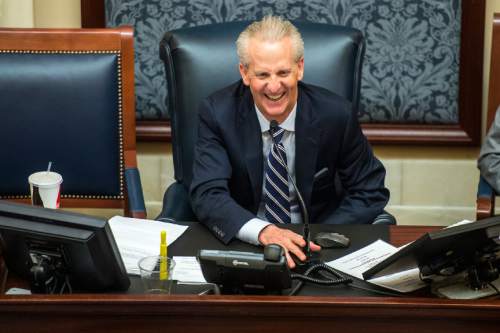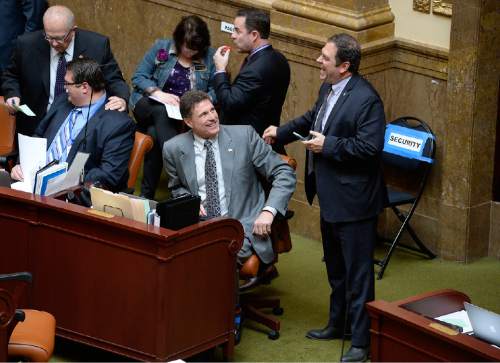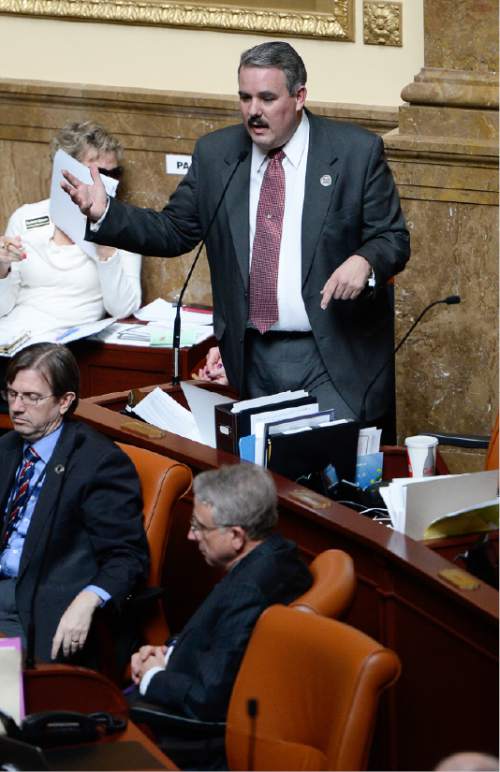This is an archived article that was published on sltrib.com in 2016, and information in the article may be outdated. It is provided only for personal research purposes and may not be reprinted.
It was an example of how the day jobs and personal interests of Utah's part-time legislators affect lawmaking.
Because he's a doctor, state Sen. Brian Shiozawa easily fielded in-depth, technical questions from a committee about why he seeks a resolution asking Congress to reclassify marijuana to allow now-banned research on its medical potential.
The emergency-room physician also related some personal experience. "I have treated hundreds of patients personally who have used marijuana either medically or recreationally. I don't think it's as bad as people say … and I don't think it's the panacea and the cure-all that some people say about this."
"I really appreciate your thoughtful approach and your medical expertise," Senate Health and Human Services Committee Chairman Evan Vickers told him. Vickers is a pharmacist, another expert, and is pushing a separate medical-marijuana bill.
Sen. Mark Madsen is sponsoring a third medical-marijuana bill and is a different sort of expert. He has traveled to Colorado, where marijuana is legal, to use the substance to treat his chronic back pain and would like to see that option here.
Shiozawa, Vickers and Madsen and their marijuana bills are examples of something common in Utah's part-time Legislature: About one of every five bills is sponsored by lawmakers with a deep professional or personal interest in them.
That could be a double-edged sword. On one hand, it allows lawmakers to take advantage of special expertise that colleagues offer from their professions. But it also creates potential conflicts of interest, and the possibility of self-dealing.
"I don't see abuse by it," said House Majority Leader Jim Dunnigan, R-Taylorsville. "I think we're very sensitive to that [potential for abuse], so we try to watch out and try to be careful that we don't see our colleagues taking advantage of that."
—
Common • The Tribune compared conflict-of-interest forms filed this year by Utah's 104 legislators to the bills they sponsored that had been introduced and numbered through Friday.
It found about 22 percent — 146 of 670 bills and resolutions — are on topics closely related to their sponsors' day jobs or other personal interests.
Some examples:
• Dunnigan, owner of an insurance agency, is sponsoring HB36, titled "Insurance Revisions," and HB282, "State Contractor Employee Health Coverage."
• Rep. Fred Cox, R-West Valley City, an architect who owns a business that consults on building codes, is sponsoring HB125, "Fire Code Amendments."
• Rep. Brad Dee, R-Ogden, the human resources director for Weber County, has HB154, "County Personnel Requirements."
• Rep. Val Peterson, R-Orem, a brigadier general in the Utah National Guard, introduced HB59, "State Armory Board Amendments."
• Sen. Allen Christensen, R-North Ogden, a retired dentist, is sponsoring SB167, "Dental Managed Care Amendments."
• Sen. Wayne Harper, R-Taylorsville, the economic development director for Taylorsville, introduced SB151, "Community Development and Renewal Agencies Act Revisions."
• Rep. Gage Froerer, R-Huntsville, a real estate broker, is sponsoring HB402, "Real Estate Amendments."
• Rep. Merrill Nelson, R-Grantsville, a lawyer who works with the LDS Church to help clergy dealing with sexual-abuse situations, introduced HB179, "Consensual Sexual Activity of a Minor."
He told a committee he introduced it because of a case he handled where a married 20-year-old man engaged in non-intercourse sexual activity with a 14-year-old. He found that is not illegal in Utah — which outlaws it only if a partner of a minor is more than seven years older. He is seeking to change that to four years.
—
Advantages • Lawmakers see advantages of members sponsoring legislation related to their professional areas.
"Having people of experience is a good thing," says Senate President Wayne Niederhauser, R-Sandy.
"I think the advantage of having a lay legislature is that we have people from all walks of life. You will have educators who understand education issues that will sponsor education legislation, and many times they are the best ones to do it because they understand the lay of the land and the details," Dunnigan said.
"We have the same thing with plumbers, Realtors, doctors, lawyers, insurance people," he added. "Some of the issues are quite technical and complicated, and so we actually get to tap into a lot of expertise here. That's what I love about our part-time Legislature."
So last week, for example, when the House debated whether to mandate that cars be impounded when drivers do not have insurance, those debating included Dunnigan (an insurance agency owner), Rep. Lee Perry (a Utah Highway patrolman) and Rep. Don Ipson (owner of a trucking agency, who complains too many other drivers lack insurance).
In a committee debate that touched on credit card fees, Rep. Keven Stratton told Sen. Kevin Van Tassell he should talk to Rep. Marc Roberts "because he works in that industry and could answer your questions."
Shiozawa, the doctor, said working on bills in health care — as he has done with medical marijuana and expansion of Medicaid — "is a natural for me because I can look at the landscape" with his background.
He says it may not be much different than "a lot of people [who] come up here with advocacy as their primary reason for running. They'll come up and say I am so in favor of public education, or charter schools, and that is why I am running so I can make a change." He says it makes sense to work in areas of expertise.
—
Dangers • When members sponsor bills related to their professions or personal interests, it creates the potential for helping themselves.
Leaders say lawmakers are sensitive to that potential, and watch to stop it.
"The beauty of the citizen legislature is that we don't have any one industry or profession that is a majority. We have a lot of attorneys, but they are still a minority population," said Niederhauser, a developer. "Having that spectrum of different people here, it helps backstop if something goes on with someone pursuing a self-interest."
He adds, "Rarely do we have a problem, because we are all vigilant. We all want to make sure we are getting good policy."
Niederhauser adds that the Legislature combats problems by requiring everyone to file conflict-of-interest forms, which are available online.
Utah is among very few states that do not allow legislators to abstain on votes where they have a conflict of interest. If they are present, they must vote.
"Without that, you'd have people taking passes on many difficult issues," Dunnigan said. "If some difficult issue comes up, someone could say I have a conflict on that and just [take] a walk. I think it's important that everyone votes on every issue."
Two years ago, former Rep. Jim Nielson, R-Bountiful, tried to change the situation. But the House Rules Committee declined to vote on the matter.
—
Elections • One general area presents a potential conflict of interest for every legislator — rules about their elections, and about how the Legislature operates.
It's the most common type of potential conflict of interest found by the Tribune, involving about one of every five of the potential conflict-of-interest bills. It also is the one area where Democrats say the majority Republicans may act inappropriately and run over them.
House Democratic Leader Brian King, D-Salt Lake City, for example points at HB220, which would add extra Republicans to legislative management and audit committees — which have traditionally had equal numbers of Republicans and Democrats.
"I've seen with this new leadership team, especially in the House, a desire to aggregate to themselves greater power," King said.
"I think they are much more prone to view things through the lenses of partisanship than other folks, and to appreciate and honor less than previous Republican leadership teams have the importance of process and procedure and to appreciate less the value that opposing viewpoints bring."
He said Republicans have such large majorities that they tend to do what they want.
But Democrats sometimes still decide some such issues when Republicans split their votes.
An example came last week when some Republicans attempted to change a compromise reached two years ago on how political parties choose their nominees.
Republicans were evenly divided — 30 to 30 in a vote. But all 12 House Democrats voted together, and kept the compromise alive.









